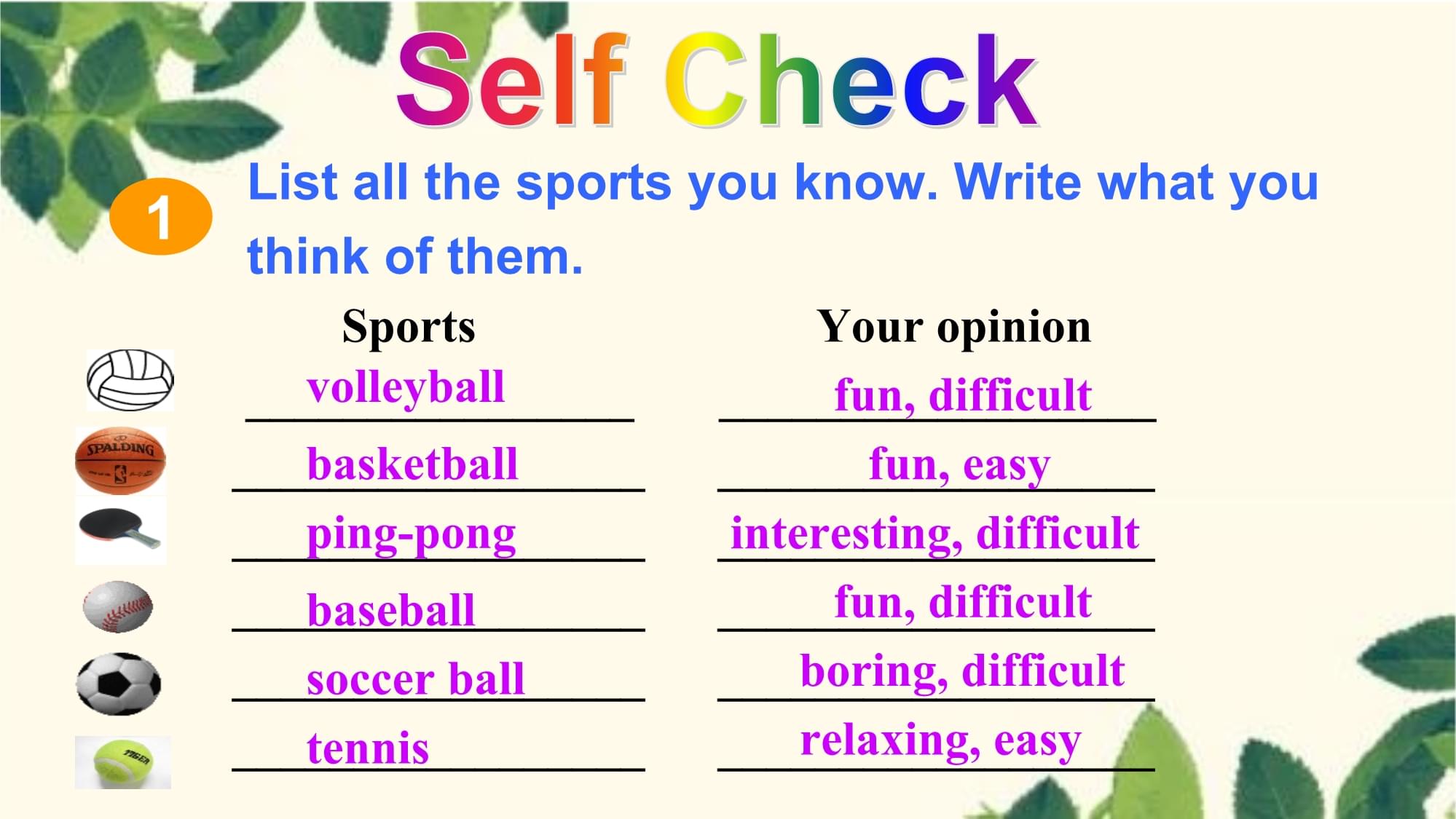




版權(quán)說(shuō)明:本文檔由用戶提供并上傳,收益歸屬內(nèi)容提供方,若內(nèi)容存在侵權(quán),請(qǐng)進(jìn)行舉報(bào)或認(rèn)領(lǐng)
文檔簡(jiǎn)介
1、Unit 5Section B23a-Self Check3aWrite more questions about sports equipment. 1. Do you have a soccer ball? ( ) Yes, I do. ( ) No, I dont.2. ( ) Yes, I do. ( ) No, I dont.3. ( ) Yes, I do. ( ) No, I dont.4. ( ) Yes, I do. ( ) No, I dont.Do you have a baseball bat? Do you have a volleyball?Do you have
2、a ping-pong bat?3bExchange books with a partner. Answer his or her questions in 3a.Look at the information in 3a. Write about yourself and your partner with but. 3c1. I have a soccer ball, but I dont have a volleyball.2. I have a ping-pong bat, but I dont have a baseball bat.3. Li Lei has a basketba
3、ll, but he doesnt have a soccer ball.4. Li Lei has a volleyball, but he doesnt have a ping-pong ball.寫(xiě)作指導(dǎo):1. but可連接兩個(gè)意思相反的句子,表示轉(zhuǎn)折關(guān)系,but前句子加逗號(hào)。2. 注意謂語(yǔ)動(dòng)詞的數(shù)與主語(yǔ)的人稱和數(shù)相一致。 Sports Your opinion _ _ _ _ _ _ _List all the sports you know. Write what you think of them. 1volleyballfun, difficult basketball fun,
4、 easyping-ponginteresting, difficultbaseballfun, difficultsoccer ballboring, difficulttennisrelaxing, easySelf Check1. A: _? B: Yes, my mom has a baseball bat.2. A: Do you have a volleyball? B: _3. A: _? B: Yeah, my father has a soccer ball.4. A: _? B: No, she doesnt. My teacher has a tennis ball.Co
5、mplete the questions and answers. 2Does your mom have a baseball batYes, I do./ No, I dont.Does your father have a soccer ballDoes your good friend have a tennis ballplay 玩;打(球) Do you play volleyball? 你打排球嗎?I can play the piano. 我會(huì)彈鋼琴。play和球類運(yùn)動(dòng)的名稱連用時(shí),球類運(yùn)動(dòng)的名稱前不用冠詞。play和樂(lè)器名稱連用時(shí),樂(lè)器名稱前一般要用定冠詞the。鏈接: pl
6、ay computer games 玩電腦游戲 play sports 參加體育運(yùn)動(dòng)或比賽 Language points活學(xué)活用:在需要的地方填寫(xiě)定冠詞 1. Lets play _ basketball. That sounds good. 2. I can play _ violin (小提琴). 3. She plays _ sports every day./theThat sounds interesting. 那聽(tīng)起來(lái)很有趣。sound意為“聽(tīng)起來(lái)”時(shí),是系動(dòng)詞,后面常接形容詞。 此外,sound后還可接名詞短語(yǔ)。 That sounds a good idea. 那聽(tīng)起來(lái)是個(gè)好
7、主意。拓展: sound還可用作名詞,意為“聲音;響聲”,泛指自然界中所能聽(tīng)到的任何聲音。活學(xué)活用用所給詞的適當(dāng)形式填空。1. Lets watch TV. That _ (sound) great!2. I have a great sports collection. That sounds _ (interest).3. Listen! Strange (奇怪的) _ (sound) are from the classroom.sounds interestingsoundsDo you have a ping-pong ball? 你有乒乓球嗎?Yes, I do. 是的,我有。Do
8、 you have a computer? 你有電腦嗎?No, I dont. 不,我沒(méi)有。當(dāng)詢問(wèn)對(duì)方是否擁有某物時(shí),常用Do you have . 這個(gè)句型,其肯定回答為Yes, I do. ,其否定回答為No, I dont.。 當(dāng)主語(yǔ)為第三人稱單數(shù)時(shí),需要借助于does來(lái)進(jìn)行提問(wèn)和回答。 Does he have a soccer ball? 他有足球嗎? Yes, he does. 是的, 他有。 Does Alice have a video tape? 愛(ài)麗絲有錄像帶嗎? No, she doesnt.不, 她沒(méi)有。活學(xué)活用選用do, dont, does, doesnt填空1.
9、_ you have a tennis racket? No, I _.2. _ Lily have a volleyball? Yes, she _.3. He _ have a pencil case; he only has a pencil.DoDoesdoesntdoesdont .根據(jù)句意及所給漢語(yǔ)提示,寫(xiě)出句中所缺單詞。1. John and Paul are _ (同班同學(xué)). They are good friends.2. She likes to play ping-pong _ (在以后) class.3. Im sure (肯定) Davids parents _ (
10、愛(ài)) him. classmates after love 4. Anna thinks playing baseball is _ (容易的).5. Where are my keys? I cant find _ (它們).easy them .根據(jù)漢語(yǔ)意思完成英語(yǔ)句子,每空一詞(含縮略形式)。1.我沒(méi)有紅色的帽子,但是我姐姐有。 I _ _ a red hat, but my sister _.2.你能和我一起去圖書(shū)館嗎? Can you _ to the library _ me?dont havedoes go with 3.我們經(jīng)常在電視上看動(dòng)畫(huà)片。 We often _ cartoons _ _.4.這對(duì)我來(lái)說(shuō)很難。 Its very _ _ _.5.露西和我不在同一個(gè)學(xué)校。 Lucy and I arent in _ _ _.6.你最喜歡的體育運(yùn)動(dòng)是什么? _ is your favorite _?watch on TV difficult for me the same sc
溫馨提示
- 1. 本站所有資源如無(wú)特殊說(shuō)明,都需要本地電腦安裝OFFICE2007和PDF閱讀器。圖紙軟件為CAD,CAXA,PROE,UG,SolidWorks等.壓縮文件請(qǐng)下載最新的WinRAR軟件解壓。
- 2. 本站的文檔不包含任何第三方提供的附件圖紙等,如果需要附件,請(qǐng)聯(lián)系上傳者。文件的所有權(quán)益歸上傳用戶所有。
- 3. 本站RAR壓縮包中若帶圖紙,網(wǎng)頁(yè)內(nèi)容里面會(huì)有圖紙預(yù)覽,若沒(méi)有圖紙預(yù)覽就沒(méi)有圖紙。
- 4. 未經(jīng)權(quán)益所有人同意不得將文件中的內(nèi)容挪作商業(yè)或盈利用途。
- 5. 人人文庫(kù)網(wǎng)僅提供信息存儲(chǔ)空間,僅對(duì)用戶上傳內(nèi)容的表現(xiàn)方式做保護(hù)處理,對(duì)用戶上傳分享的文檔內(nèi)容本身不做任何修改或編輯,并不能對(duì)任何下載內(nèi)容負(fù)責(zé)。
- 6. 下載文件中如有侵權(quán)或不適當(dāng)內(nèi)容,請(qǐng)與我們聯(lián)系,我們立即糾正。
- 7. 本站不保證下載資源的準(zhǔn)確性、安全性和完整性, 同時(shí)也不承擔(dān)用戶因使用這些下載資源對(duì)自己和他人造成任何形式的傷害或損失。
最新文檔
- 商業(yè)物業(yè)管理委托合同
- 乳膠漆粉刷施工合同協(xié)議書(shū)
- 高中數(shù)學(xué)新課標(biāo)學(xué)案:第課時(shí)條件排列
- 門(mén)臉租戶轉(zhuǎn)讓合同范本
- 和藝人的合同范本
- 汽車分期合同范本
- 庫(kù)存打折銷售合同范本
- 《五四愛(ài)國(guó)運(yùn)動(dòng)和中國(guó)共產(chǎn)黨的成立》新民主主義革命的興起課件-1
- 蘇教版小學(xué)數(shù)學(xué)教材解析
- 2025版權(quán)普通許可使用合同示例
- 《春秋三傳導(dǎo)讀》課件
- 教師情緒和壓力疏導(dǎo)課件
- 麻醉科進(jìn)修匯報(bào)課件
- 中小學(xué)生心理健康教育主題班會(huì)PPT教學(xué)課件
- ISO-IEC 27002-2022中文版完整詳細(xì)
- 口腔正畸病例書(shū)寫(xiě)模板
- 呼叫中心產(chǎn)業(yè)研究報(bào)告
- 年產(chǎn)5萬(wàn)噸電石爐窯節(jié)能改造項(xiàng)目環(huán)境影響后評(píng)價(jià)報(bào)告
- 國(guó)內(nèi)外材料牌號(hào)對(duì)照
- 藥物臨床試驗(yàn)概述課件(PPT 23頁(yè))
- HP系列圓錐破碎機(jī)常見(jiàn)故障

評(píng)論
0/150
提交評(píng)論